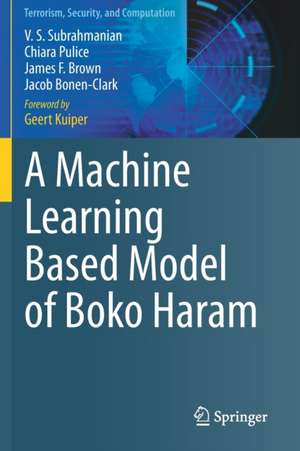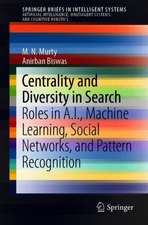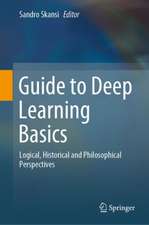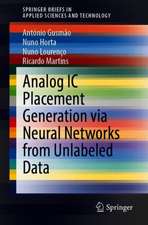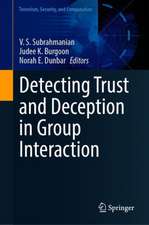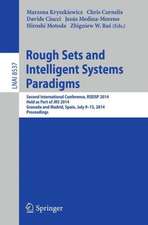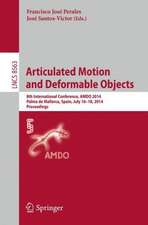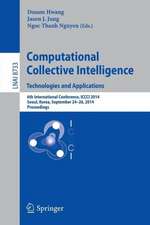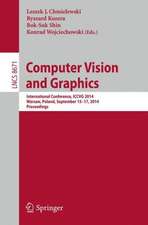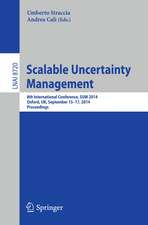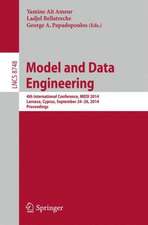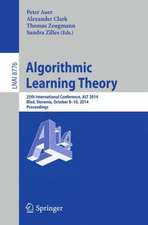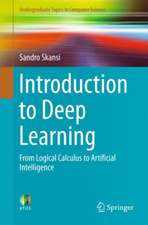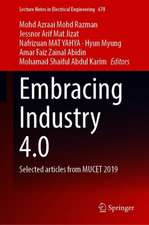A Machine Learning Based Model of Boko Haram: Terrorism, Security, and Computation
Autor V. S. Subrahmanian, Chiara Pulice, James F. Brown, Jacob Bonen-Clark Cuvânt înainte de Geert Kuiperen Limba Engleză Paperback – 13 dec 2021
After reducing Boko Haram’s history to a spreadsheet containing monthly information about different types of attacks and different circumstances prevailing over a 9 year period, this book introduces Temporal Probabilistic (TP) rules that can be automatically learned from data and are easy to explain to policy makers and security experts. This book additionally reports on over 1 year of forecasts made using the model in order to validate predictive accuracy. It also introduces a policy computation method to rein in Boko Haram’s attacks.
Applied machine learning researchers, machine learning experts and predictive modeling experts agree that this book is a valuable learning asset. Counter-terrorism experts, national and international security experts, public policy experts and Africa experts will also agree this book is a valuable learning tool.
| Toate formatele și edițiile | Preț | Express |
|---|---|---|
| Paperback (1) | 922.83 lei 6-8 săpt. | |
| Springer International Publishing – 13 dec 2021 | 922.83 lei 6-8 săpt. | |
| Hardback (1) | 928.94 lei 6-8 săpt. | |
| Springer International Publishing – 12 dec 2020 | 928.94 lei 6-8 săpt. |
Preț: 922.83 lei
Preț vechi: 1153.54 lei
-20% Nou
Puncte Express: 1384
Preț estimativ în valută:
176.59€ • 188.83$ • 147.23£
176.59€ • 188.83$ • 147.23£
Carte tipărită la comandă
Livrare economică 18 aprilie-02 mai
Preluare comenzi: 021 569.72.76
Specificații
ISBN-13: 9783030606169
ISBN-10: 3030606163
Ilustrații: XII, 135 p. 38 illus., 29 illus. in color.
Dimensiuni: 155 x 235 mm
Greutate: 0.22 kg
Ediția:1st ed. 2021
Editura: Springer International Publishing
Colecția Springer
Seria Terrorism, Security, and Computation
Locul publicării:Cham, Switzerland
ISBN-10: 3030606163
Ilustrații: XII, 135 p. 38 illus., 29 illus. in color.
Dimensiuni: 155 x 235 mm
Greutate: 0.22 kg
Ediția:1st ed. 2021
Editura: Springer International Publishing
Colecția Springer
Seria Terrorism, Security, and Computation
Locul publicării:Cham, Switzerland
Cuprins
Chapter 1: Introduction.- Chapter 2: History of Boko Haram.- Chapter 3: Temporal Probabilistic Rules and Policy Computation Algorithms.- Chapter 4: Sexual Violence.- Chapter 5: Suicide Bombings.- Chapter 6: Abductions.- Chapter 7: Arson.- Chapter 8: Other Types of Attacks.- Appendix A: All TP-Rules.- Appendix B: Data Collection.- Appendix C: Most Used Variables.- Appendix D: Sample Boko Haram Report.
Notă biografică
V.S. Subrahmanian is the Dartmouth College Distinguished Professor in Cybersecurity, Technology, and Society and Director of the Institute for Security, Technology, and Society at Dartmouth. He previously served as a Professor of Computer Science at the University of Maryland from 1989-2017 where he created and headed both the Lab for Computational Cultural Dynamics and the Center for Digital International Government. He also served for 6+ years as Director of the University of Maryland's Institute for Advanced Computer Studies. Prof. Subrahmanian is an expert on big data analytics including methods to analyze text/geospatial/relational/social network data, learn behavioral models from the data, forecast actions, and influence behaviors with applications to cybersecurity and counter-terrorism. He has written five books, edited ten, and published over 300 refereed articles. He is a Fellow of the American Association for the Advancement of Science and the Association forthe Advancement of Artificial Intelligence and received numerous other honors and awards. His work has been featured in numerous outlets such as the Baltimore Sun, the Economist, Science, Nature, the Washington Post, American Public Media. He serves on the editorial boards of numerous journals including Science, the Board of Directors of SentiMetrix, Inc., and on the Research Advisory Board of Tata Consultancy Services. He previously served on t he Board of Directors of the Development Gateway Foundation (set up by the World Bank), DARPA's Executive Advisory Council on Advanced Logistics and as an ad-hoc member of the US Air Force Science Advisory Board.
Chiara Pulice worked on this project during her stint as a postdoctoral researcher at Dartmouth College in Hanover, New Hampshire. She received her PhD degree in Computer and Systems Engineering from the University of Calabria, Italy, in 2015. She was a Visiting Scholar at the Department of Computer Science ofthe University of British Columbia (2013-2014), and a Postdoctoral Researcher at the University of Maryland Institute for Advanced Computer Studies (2016-2017). Her research interests include data integration, inconsistent databases, data mining, machine learning and social network analysis.
James F. Brown is an alumnus of Dartmouth’s Computer Science Department. He graduated with a master’s in computer science in 2020. In 2018, he got his bachelor’s in computer science from Southern Connecticut State University. At Dartmouth, James worked under V.S. Subrahmanian to develop machine learning models that can predict acts of terror. After graduating from Dartmouth, James went on to work in the private sector in New York City.
Jacob Bonen-Clark is currently pursuing a Master of Public Policy at Harvard University’s Kennedy School of Government. Jacob received undergraduate degrees in Economics and Peace, War, and Defense from the University of North Carolina at Chapel Hill. He worked in finance and accounting at a midstream oil and natural gas company in Denver, Colorado from 2017-2020. Jacob will focus his studies at the Kennedy School on electoral politics and climate change.
Chiara Pulice worked on this project during her stint as a postdoctoral researcher at Dartmouth College in Hanover, New Hampshire. She received her PhD degree in Computer and Systems Engineering from the University of Calabria, Italy, in 2015. She was a Visiting Scholar at the Department of Computer Science ofthe University of British Columbia (2013-2014), and a Postdoctoral Researcher at the University of Maryland Institute for Advanced Computer Studies (2016-2017). Her research interests include data integration, inconsistent databases, data mining, machine learning and social network analysis.
James F. Brown is an alumnus of Dartmouth’s Computer Science Department. He graduated with a master’s in computer science in 2020. In 2018, he got his bachelor’s in computer science from Southern Connecticut State University. At Dartmouth, James worked under V.S. Subrahmanian to develop machine learning models that can predict acts of terror. After graduating from Dartmouth, James went on to work in the private sector in New York City.
Jacob Bonen-Clark is currently pursuing a Master of Public Policy at Harvard University’s Kennedy School of Government. Jacob received undergraduate degrees in Economics and Peace, War, and Defense from the University of North Carolina at Chapel Hill. He worked in finance and accounting at a midstream oil and natural gas company in Denver, Colorado from 2017-2020. Jacob will focus his studies at the Kennedy School on electoral politics and climate change.
Textul de pe ultima copertă
This is the first study of Boko Haram that brings advanced data-driven, machine learning models to both learn models capable of predicting a wide range of attacks carried out by Boko Haram, as well as develop data-driven policies to shape Boko Haram’s behavior and reduce attacks by them. This book also identifies conditions that predict sexual violence, suicide bombings and attempted bombings, abduction, arson, looting, and targeting of government officials and security installations.
After reducing Boko Haram’s history to a spreadsheet containing monthly information about different types of attacks and different circumstances prevailing over a 9 year period, this book introduces Temporal Probabilistic (TP) rules that can be automatically learned from data and are easy to explain to policy makers and security experts. This book additionally reports on over 1 year of forecasts made using the model in order to validate predictive accuracy. It also introduces a policy computation method to rein in Boko Haram’s attacks.
Applied machine learning researchers, machine learning experts and predictive modeling experts agree that this book is a valuable learning asset. Counter-terrorism experts, national and international security experts, public policy experts and Africa experts will also agree this book is a valuable learning tool.
After reducing Boko Haram’s history to a spreadsheet containing monthly information about different types of attacks and different circumstances prevailing over a 9 year period, this book introduces Temporal Probabilistic (TP) rules that can be automatically learned from data and are easy to explain to policy makers and security experts. This book additionally reports on over 1 year of forecasts made using the model in order to validate predictive accuracy. It also introduces a policy computation method to rein in Boko Haram’s attacks.
Applied machine learning researchers, machine learning experts and predictive modeling experts agree that this book is a valuable learning asset. Counter-terrorism experts, national and international security experts, public policy experts and Africa experts will also agree this book is a valuable learning tool.
Caracteristici
The first quantitative study of Boko Haram The first book to provide a machine learning predictive model of attacks by Boko Haram The first book that validates a counter-terrorism predictive model with over a year of real world predictions The first book that provides a data-driven, artificial intelligence based set of policy options against Boko Haram
